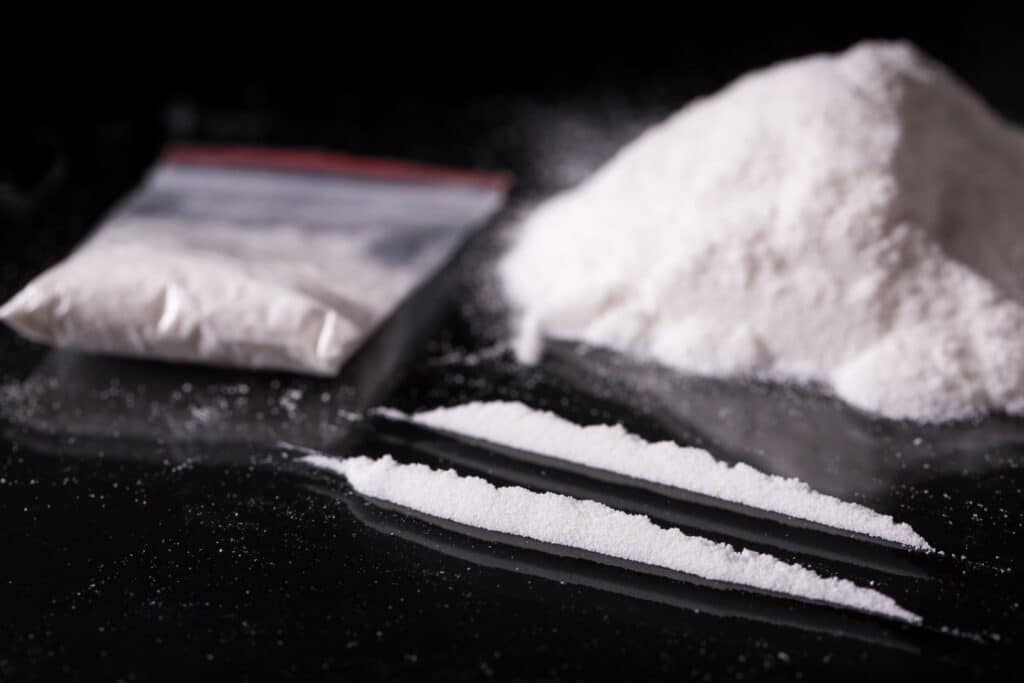Cocaine’s allure can be quite powerful, but its grip on a person’s life doesn’t have to be permanent. In fact, cocaine addiction treatment is perfectly possible if you seek the right help.
If you or someone you love is struggling with cocaine addiction in Boynton Beach, this guide will cover everything you need to know to set foot in the right direction.
Keep on reading for more information about how cocaine affects the nervous system, the causes and signs of its addiction, and the effective treatment options available near you.

Table of Contents
How Does Cocaine Affect the Brain?
Cocaine is one of the most powerful stimulant drugs and goes by a wide range of slang and street names, including “crack”, “blow”, and “snow”.
One key way cocaine works is by interfering with brain chemicals, including dopamine, epinephrine, norepinephrine, and serotonin. These neurotransmitters are associated with enhanced activity and sensation of pleasure and reward.
Normally, these chemicals are recycled through a reuptake process when it’s released by the body. However, cocaine disrupts this process, flooding the brain with these chemicals and their effect.
Currently, cocaine has no practical use as a medication in the United States, so it’s considered an illegal Schedule II drug under the Controlled Drug Act.
What Makes It So Addictive?
This surge of brain chemicals after using cocaine creates a euphoric high. This intense feeling of pleasure is a major reason behind the addictiveness of cocaine.
Over time, the brain adapts to this overload of chemicals, making it harder to experience pleasure without the drug and promoting the compulsive use of cocaine.
However, as the body develops tolerance towards cocaine, it becomes less sensitive to its effects.
As a result, users require increasingly higher doses to experience the same pleasurable high they initially felt.
This cycle of use, adaptation, and craving develops into dependence and addiction extremely quickly.
As addiction progresses, users lose control over their substance use, and simple daily events become potential triggers, so the desire for more cocaine overrides rational thought and self-control.
Is Cocaine Addiction Common in Florida?
Florida consistently ranks as one of the top states when it comes to drug use and overdose, and cocaine is a significant contributor, as 5.91% of young adults in the state were reported to use the potent stimulant.
The DEA also warned against the quality of cocaine available on the streets in Florida. According to the report, contaminated cocaine in Florida contributes to the state’s abnormally high mortality rate.
The dangers of cocaine addiction aren’t only related to its mortality rate, as it also has serious long-term side effects with continuous use. For example, chronic cocaine use can lead to serious cardiovascular problems and increase the risk of heart attacks and strokes.
What Causes Cocaine Addiction?
Understanding the causes of substance use is an essential part of treating addictive patterns, as it helps you identify the root issues that lead to this unfortunate outcome.

The problem here is that addiction is a complex condition that usually stems from a wide range of contributing factors. However, some of these factors are quite common among different individuals. Here’s a quick look at them.
Family History and Trauma
A chaotic or unstable home environment can be a breeding ground for addiction. This can include factors like parental substance abuse, neglect, physical or emotional abuse, or witnessing domestic violence.
Studies show that children raised in these environments are more likely to turn to substance use, such as cocaine, as a coping mechanism.
Social and Environmental Factors
The surrounding environment can put a lot of pressure on those who are prone to cocaine addiction.
Being under constant stress might push individuals to abuse the stimulating effect of cocaine as a way to boost performance, which always leads to dependence and addiction. This is common in high-pressure settings, whether academic or professional.
Friends and social circles who use drugs or alcohol heavily can normalize cocaine use and create pressure to participate.
Easy Access and Lack of Awareness
In Florida, buying cocaine on the streets can be quite easy. This makes it easier for individuals with little awareness about its dangers to try it and fall into the cycle of cocaine addiction.
Mental Health Problems
People with mental health conditions like depression, anxiety, or ADHD may use cocaine as a method to cope or self-medicate. This also comes from a lack of awareness about cocaine’s dangerous effects on the body and mind after continuous use.
Common Signs and Symptoms of Cocaine Addiction
Cocaine addiction shows itself in different ways depending on the dose and duration of dependence.
Some warning signs may start appearing quickly, while others creep up over time. Here’s a breakdown of short-term and long-term effects to help you identify potential problems:
Early Signs of Cocaine Use
- Dilated pupils
- Frequent sniffles with a running nose, which is due to snorting the drug
- Insomnia or noticeable changes in sleep patterns
- Loss of appetite and weight fluctuation
- Constant agitation and restlessness
- Increased heart and breathing rate
- Overexcitement and talkativeness
- Erratic behaviors and engaging in risky actions
- Loss of interest in hobbies and activities
Late Stage Symptoms of Cocaine Addiction
- Anxiety and paranoia
- Depression and feelings of hopelessness (associated with failing to quit cocaine addiction)
- Neglecting responsibilities at work or school
- Failing to hide drug use or paraphernalia
- Withdrawing from social activities
- Borrowing or stealing money to buy cocaine
- Aggression and engaging in risky or illegal means to obtain cocaine
- Malnutrition and fatigue from lack of sleep and eating
How to Treat Cocaine Addiction
Seeking professional help while treating dependence is usually the best way to address cocaine addiction. This is because each case has its unique circumstances and needs, so creating a personalized plan is extremely necessary to ensure the success of treatment.

Additionally, medical professionals will typically combine several evidence-based strategies to address the physical, psychological, and social aspects of addiction. Here’s a brief overview of the common treatment methods used for cocaine addiction.
Medically Assisted Detoxification
Any cocaine addiction treatment plan should start with medical detoxification, as it’s the process where the body gets rid of cocaine and its metabolites.
This is best done in safe and controlled environments like rehab facilities to manage the discomforts associated with withdrawal symptoms.
Qualified professionals may also use special supportive medications like methadone or buprenorphine to reduce cravings and ease physical discomfort.
While residential treatment is usually the way to go with cocaine addiction, medical professionals may allow outpatient treatment in mild cases.
This is where patients can return home every day after receiving medical care in the rehab facility while staying under supervision.
Individual Counseling and Behavioral Therapy
Therapy represents the core treatment of cocaine addiction after medical detoxification. It can take a huge variety of forms to target different aspects.
The primary method is through individual counseling and behavioral therapy, where sessions help patients explore the root causes of addiction and address these factors to avoid relapse.
The most popular form of therapy used here is cognitive behavioral therapy or CBT. This widely-established approach helps patients pinpoint the negative thoughts and mental patterns that lead to drug use.
By working on these aspects, patients can develop healthier coping mechanisms built on positivity and self-control.
Group Therapy
Group therapy is all about creating a supportive environment for people suffering from cocaine addiction to help them connect and share their experiences.
This activity helps them foster a sense of community and belonging, which counteracts the effects of isolation and stigmatization associated with drug use.
These group sessions include 12-step like Narcotics Anonymous as well as non-12-step meetings.
Family Therapy
The effects of cocaine addiction don’t only impact the user, but also their entire family and close circle.

Family therapy can help loved ones offer their support to their recovering family member in a controlled environment while setting healthy boundaries to communicate and work on regaining trust and overcoming the past.
Dual Therapy
This form of therapy is critical for those who already suffer from co-occurring mental health conditions that lead to addiction, such as anxiety and depression.
The aim of this therapy is to address these conditions to eliminate their effect and reduce the risk of relapsing and achieving long-lasting recovery.
Complementary Therapy
In addition to traditional treatment approaches, medical professionals might recommend complementary therapies that focus on overall well-being.
These include anything from yoga and meditation to acupuncture and massage therapy. It can also include workouts and exercise to improve overall health in addition to enhancements in dietary habits to compensate for malnutrition associated with cocaine addiction.
It’s important to note that on their own, these methods are not enough to treat cocaine addiction, but they still contribute massively to a carefully designed plan.
Finding the Best Treatment for Cocaine Addiction in Boynton Beach
Recovery from cocaine addiction isn’t an impossible challenge. However, it still takes time, dedication, and the right support system to conquer.
Luckily, there is plenty of help and support you can receive from experts here at Recreate Life Counseling, so don’t hesitate to reach out online or through our 24/7 confidential hotline.



